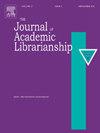探索学术图书馆中性取向、性别认同和表达的影响
IF 2.5
3区 管理学
Q2 INFORMATION SCIENCE & LIBRARY SCIENCE
引用次数: 0
摘要
学术图书馆依靠数据驱动的衡量标准和结果来评估和改进其为不同文化背景的读者和工作 人员提供支持的服务质量。然而,除了收集传统意义上的二元性别选择外,几乎没有其他研究,也几乎没有关于性取向的人口统计数据。本文旨在探讨学术图书馆工作人员在性取向、性别认同和表达(SOGIE)方面的经验。具体来说,本研究试图回答五个研究问题,旨在更好地了解那些被认定为女同性恋、男同性恋、双性恋、变性人、同性恋/质疑者、双性人或无性人(LGBTQIA+)的人的工作文化体验。方法通过混合方法的探索,在多个专业列表服务器上向美国学术图书馆工作者分发了一份便利调查。对 233 名学术图书馆工作者进行了定量分析,汇总了他们的性别认同信息以及其他个人和职业特征。接下来,实证分析研究了在四个开放式问题(OeQs)中表达的 674 条评论,并据此制定了 SOGIE 分类方案。定性过程使研究人员能够在每个开放式问题中发展出总体主题和子类别,以探索人们选择公开自己身份的原因以及他们的工作满意度和未来计划。研究结果大多数 LGBTQIA+ 在学术图书馆环境中感到安全并得到支持。结果表明,与那些被认定为异性恋的人相比,没有明显的差异。许多被认定为 LGBTQIA+ 的人要么在工作场所完全公开自己的身份,要么认为自己的性别认同不是问题。尽管如此,几乎同样数量的受访者表示,他们在披露身份时采取了选择性策略,或者选择不向任何人透露自己的身份。无论哪种情况,大多数人都认为,他们的性别认同并不影响他们在职业中取得成功或茁壮成长。当被问及身份不符者的弊端或后果时,他们表达了倦怠、对污名的恐惧以及对安全的担忧,而这些往往与地区和/或机构的文化或氛围有关。最后,无论身份如何,绝大多数受访者都表示,在学术图书馆工作给他们带来了很高 的个人和职业成就感,他们在描述自己的工作时经常使用 "热爱"、"激情 "或 "享受" 等词语。本文章由计算机程序翻译,如有差异,请以英文原文为准。
Exploring the impact of sexual orientation, gender identity, and expression in academic libraries
Academic libraries rely on data-driven measures and outcomes to evaluate and improve the quality of their services supporting culturally diverse patrons and staff. There is little research however, that goes beyond collecting traditionally binary choices of gender, and virtually no demographic data on sexual orientation. The purpose of this paper is to explore an academic library worker's experience via their Sexual Orientation, Gender Identity, and Expression (SOGIE). Specifically, the present study seeks to answer five research questions targeted toward gaining a better understanding of the work culture experience for those who identify as Lesbian, Gay, Bisexual, Transgender, Queer/Questioning, Intersex, or Asexual (LGBTQIA+).
Methodology
Through a mixed-methods exploration, a convenience survey was distributed across multiple professional listservs to academic library workers in the United States. A quantitative analysis of 233 academic library workers was conducted that compiled information regarding their SOGIE identities as well as other personal and professional characteristics. Next, an empirical analysis examined 674 comments expressed within four open-ended questions (OeQs), which led to development of a SOGIE classification scheme. The qualitative process enabled researchers to develop overarching themes and subcategories within each OeQ to explore why people choose to disclose their identity as well as their level of job satisfaction and plans for the future.
Findings
The majority of LGBTQIA+ individuals felt safe and supported in an academic library environment. Results indicated that there were no significant differences when compared to those who identified as heterosexual. Many who identified as LGBTQIA+ were either fully out in the workplace or believed their SOGIE identity to be a non-issue. That said, nearly an equal number of respondents indicated they were selective in their disclosure strategies or chose not to reveal their identity to anyone. In either case, most believed that their SOGIE identity did not impact their ability to succeed or thrive in the profession. When questioned about drawbacks or consequences for those with non-conforming identities, instances of burn-out, fear of stigma, and safety concerns were expressed that were often associated with regional and/or institutional culture or climate. Lastly, and regardless of identity, an overwhelming number of respondents commented that working in academic libraries provided them with high levels of personal and professional fulfillment, frequently using some version of the terms love, passion, or enjoy when describing their work.
求助全文
通过发布文献求助,成功后即可免费获取论文全文。
去求助
来源期刊

Journal of Academic Librarianship
INFORMATION SCIENCE & LIBRARY SCIENCE-
CiteScore
5.30
自引率
15.40%
发文量
120
审稿时长
29 days
期刊介绍:
The Journal of Academic Librarianship, an international and refereed journal, publishes articles that focus on problems and issues germane to college and university libraries. JAL provides a forum for authors to present research findings and, where applicable, their practical applications and significance; analyze policies, practices, issues, and trends; speculate about the future of academic librarianship; present analytical bibliographic essays and philosophical treatises. JAL also brings to the attention of its readers information about hundreds of new and recently published books in library and information science, management, scholarly communication, and higher education. JAL, in addition, covers management and discipline-based software and information policy developments.
 求助内容:
求助内容: 应助结果提醒方式:
应助结果提醒方式:


